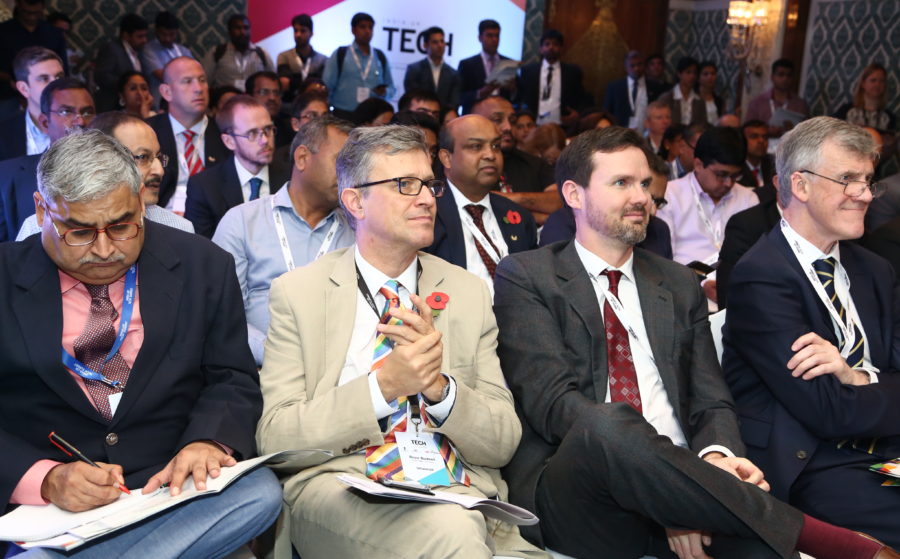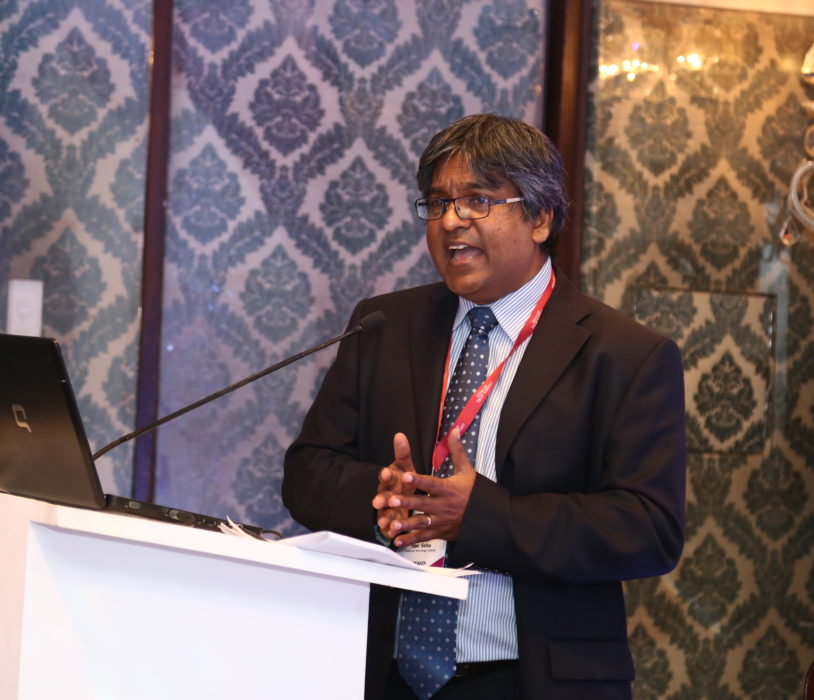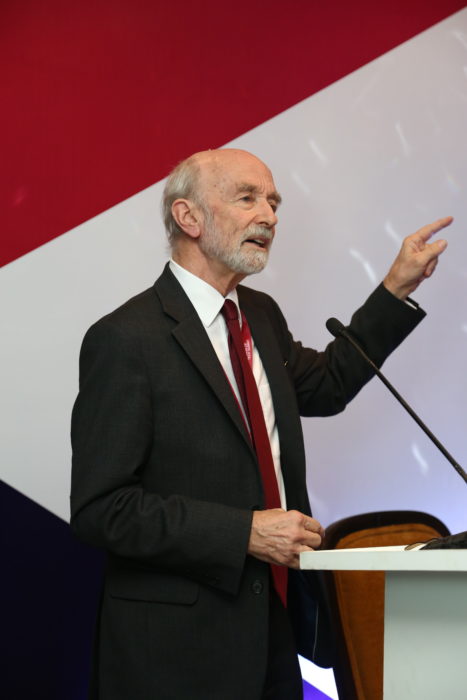18th November 2016 Kolkata, India
My TECH Summit

I’ve been converted to a new way of thinking. I may have used this thinking before, but I wasn’t conscious of it. I’m now a proponent of ‘T-bar’ thinking and ‘T-bar’ learning. I’ve had a quick look on the Internet and can’t find any obvious gurus on the subject. Perhaps I could patent it …
My imagination is carrying me away. That’s the result of attending last week’s TECH Summit in New Delhi. I listened to and chatted with, people who were far more intelligent and wiser than me. I came across a lot of ideas and thinking which captured my imagination.
As readers of my last blog will know, I was preoccupied about finding a good definition for the word technology. Not having a lead part in organising the event, I wasn’t quite sure what to expect. The Summit turned out to be a mixture of exhibition and lecture, with lots of panel discussions. But most of all it was a networking event.
I didn’t find any better definition for the word, but the following are my highlights.
A mind-blowing statement

I was listening to Professor Ravi Silva, Head of the Advanced Technology Institute (ATI) of the University of Surrey. He said that the energy in one hour of sunshine was enough to supply the needs of the whole earth for one year.
I was startled by his statement: My first thoughts were to ask myself if his statement was true. It sounded like a lot of energy. And if his statement was true, where did the energy that we don’t capture go? I also started to think about how much cleaner it would be if we could capture that energy than using fossil fuels – which was probably the thought Professor Silva wanted to instil in his audience.
I was so pre-occupied by my thoughts, I lost the thread of what he was saying. When I came to, he was talking about using fullerenes, a form of carbon. I think he was explaining they might be the solution as to how we can capture much more solar energy. A quick search on my return to Kolkata suggested that this was right. But the technology is still being developed.
The Internet of things

I was in London for a few months before I came to India, and started to hear much more about the Internet of things. One of my neighbours showed me how he had put on one network most of his electronic devices – computer, television, audio hi-fi and so on.
At the TECH Summit, there were several members of the Royal Academy of Engineering. One of them was Professor Mike Gregory OBE, Former Head of IfM, University of Cambridge who talked talk about the potential for manufacturing in using the same technology – the Internet. He said that using big data, new materials and a much wider base of knowledge and techniques would change how we produce things.
He painted a very positive image of having a dispersal of factories, which consumed less energy and raw materials and produced fewer harmful emissions. He called this new way of production ‘distributed manufacturing’.
The idea of dispersed factories was very appealing. I missed his explanation as to how this new world would come about, but I liked the idea of much cleaner industry.
Back to the future for agriculture
One of the subject areas I wanted to cover was agriculture. As a farmer’s son, I still have an attachment to rural life and finding out about the latest developments in farming.
Unfortunately, I couldn’t cover the agri-tech sessions, but I ran into Graham Edwards who was representing a company called Trantor Tractors. We started talking about his company and how its tractors were much lighter and so needed less power consuming less fuel.
He was delighted to discover that I was born near Reading in the south of England. He told me to look at a lecture delivered at the University of Reading on conservation agriculture. The contention of the lecturer, Professor Amir Kassim, was that agricultural land, especially in tropical areas, was too deeply ploughed, and so has become degraded.
Edwards told me that farmers should plough much less deeply – only 2½ inches or 6 cm into the soil. This would preserve the soils much better than deep ploughing which broke up the soil’s surface and led to erosion of the top soil.
I remembered from my history that during Roman times in Europe, the main plough was very light. My subsequent search on the Internet came up with the scratch plough. This worked well in Mediterranean areas, but not so well in northern Europe where there were (and are) heavier soils. Heavier ploughs were developed towards the end of the Roman era.
T-bar learning
The phrase cropped up more than once during the event. The idea is that we all need a vertical skill or learning where we have deep knowledge of a specific area. This is our value or comparative advantage as Adam Smith might say. But such skills are not enough.
We also need horizontal skills to allow us to work with others, and to collaborate with other specialists, and apply our learning in other areas and not just our own. Several speakers noted that the success of new enterprises didn’t require technology, but also good people who could work together well.
To my mind, T-bar thinking is about learning to work with others, or to think laterally and not just according to your own logic. Much as I’d like to coin the term, I think others have got there before me. There are many other names for it – in academia, the idea of inter-disciplinary studies is an equivalent. But it’s a useful idea to ask whether you’re stuck in your vertical or whether you can see wider.
That was the best thing for me about the TECH Summit – it took me out of my usual environment and allowed me to meet lots of other people from different worlds.
Dear Bruce.,Thank you for featuring an IMPORTANT change to the way in which farmers must now think…….in order to preserve & improve the soil-health of this very important farming country……… with its fast growing population & lots of DEGRADED soil.
Prof Kassam of Reading University was a key speaker at the 4th world conference in DELHI ……on Conservation Agriculture {CA]…..the no-till farming system……as farmers around the world call it.
The implications of CA on farm machinery are virtually UNknown by the Tractor & Ag-Implement makers of the world…….. vested interest in the ploughing system Is obvious !!!
My interest in INDIA concerns the need to change ALL of those 700,000 tractors made per year in India but ALSO……with BRITISH INNOVATION to bring this new system [& its implications for farm machinery re-design] in to the centre of INDIA`S vast Ag-machinery industry…..& ,therefore TOGETHER to LEAD in the worldwide farm equipment industry.
This is why my company asked me to come to the Tech-Summit and to speak in the AG-Tech section in Delhi & in the Agri-Tech Roundtable event in CHANDIGARH where DAVID Lelliott & Dipankar Chakrobarthy were the organisers.
Where else but in PUNJAB & HARYANA ,with those two Ag-universities [PAU & HAU] so experienced in understanding CA………should such an event be understood & appreciated.
Thank you,as a person from a farming family,for bringing these CA interests in to your blog.
I much prefer invarmotife articles like this to that high brow literature.
Thank you for the interest. Whose high brow literature are you referring to?